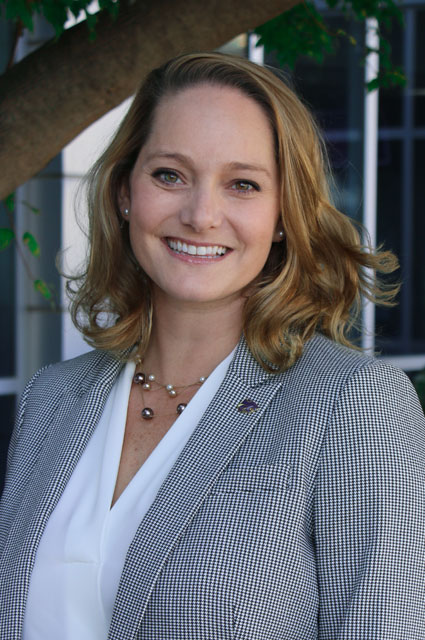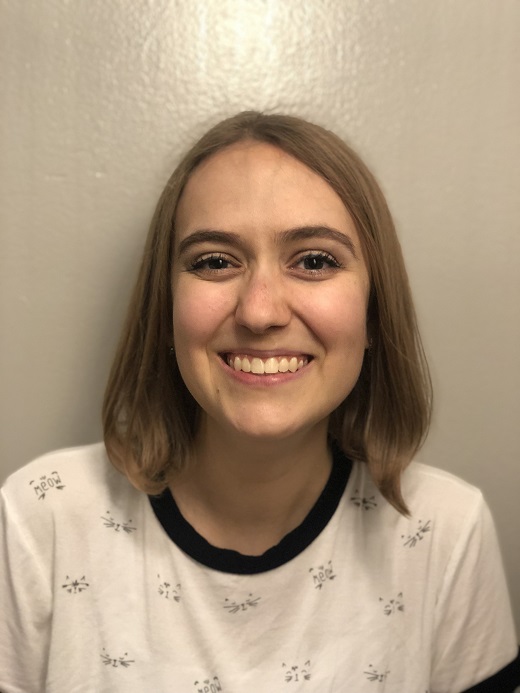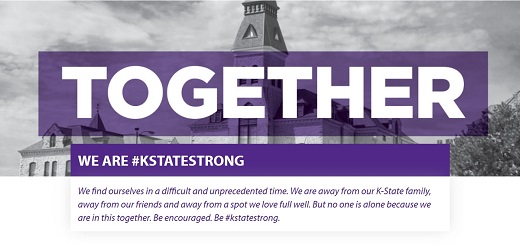06/10/20
K-State Current - June 10, 2020
K-State Current is a weekly news update for the Kansas Board of Regents to apprise the Regents on a few of the many successes and achievements made by K-State faculty, staff and students.
K-State News
Visit K-State’s “We Are #KStateStrong” site to view brief videos designed to keep the K-State family engaged, connected and inspired during these challenging times.
University hosting drive-thru flour distribution
 Kansas State University President Richard Myers assists with the flour production on June 4 at the Hal Ross Flour Mill. The university will distribute 1,500 10-pound bags flour to those in need from 3-7 p.m. June 18.
Kansas State University President Richard Myers assists with the flour production on June 4 at the Hal Ross Flour Mill. The university will distribute 1,500 10-pound bags flour to those in need from 3-7 p.m. June 18.
Three months after Kansas State University implemented limited operations and moved to remote instruction, the Department of Grain Science and Industry has brought the Hal Ross Flour Mill back online to manufacture flour for those in need in the local community.
The university will host a drive-thru flour distribution from 3-7 p.m. Thursday, June 18, at the Hal Ross Flour Mill, 1980 Kimball Ave., Manhattan. There is no charge for the flour, which will be limited to one 10-pound bag per vehicle and is not for resale.
As safer at home orders began, faculty noticed the absence of flour at local supermarkets and wondered if the university's milling facilities could be used to aid the local community. This idea received unanimous support from college and university leadership and moved into the planning stages several weeks ago.
"We know people are struggling with basic food supplies, including flour. It's something K-State and the department could do," said Gordon Smith, professor and head of the grain science and industry department. "We have a mill, we have highly skilled faculty to run the mill, and continued support from the Kansas Wheat Commission and Kansas wheat farmers. It is a locally sourced, farm-to-table, philanthropic endeavor by K-State."
Recently, 20,000 pounds of wheat was milled by departmental faculty with special help from K-State President Richard Myers. Ten hours of milling yielded 15,000 pounds of all-purpose white flour. The remaining parts of the wheat berry not used in the flour will be used for animal feed.
"The Kansas Wheat Commission and the K-State Department of Grain Science and Industry have a long history of working together on projects for the wheat industry, combining stakeholder input with the department's flour milling expertise," stated Justin Gilpin, chief executive officer for the Kansas Wheat Commission and Kansas Association of Wheat Growers. "Kansas wheat farmers were glad to help support this project. Wheat is a staple food for many Americans and this project by K-State will help put it in the hands of people in need."
The university plans to donate any flour not distributed on June 18 to the Flint Hills Breadbasket in Manhattan and Harvesters in Topeka.
K-State is the only higher education institution in the world that offers bachelor's degrees milling, bakery and feed science and management, which are available through the Department of Grain Science and Industry in the College of Agriculture.
Johnson Cancer Research Center provides nearly $600,000 for research, education
 Cancer research and education programs at Kansas State University received a big boost from donations made to the university's Johnson Cancer Research Center.
Cancer research and education programs at Kansas State University received a big boost from donations made to the university's Johnson Cancer Research Center.
"Clinical treatments start with basic cancer research, but this initial step is expensive," said Sherry D. Fleming, director of the Johnson Cancer Research Center and professor of biology. "Unlike clinical cancer providers who charge fees for their work, researchers constantly seek grant funds to support their work."
Private donations to the cancer research center provide hundreds of thousands of dollars a year to support innovative cancer research, laboratory equipment purchases, mentoring of student researchers and more. Information about all the awards is accessible on the center's award programs webpage, cancer.k-state.edu/awards/.
In fiscal year 2020, the center awarded $585,832 to support cancer research and training. It provided $210,200 to faculty for studies into such areas as breast cancer metastasis, DNA damage and carcinogenesis, immunotherapy against lung cancer, and inhibiting collective tumor invasion. It provided $242,132 to graduate and undergraduate students, and $50,000 to the Center of Excellence for Pancreatic Cancer Research. The center also provided $75,000 to support the purchases of a nuclear magnetic resonance machine in the biochemistry and molecular biophysics department and a cell sorter for the Flow Cytometry Core Facility in the diagnostic medicine and pathobiology department.
"We are grateful for the many friends whose donations fund our most promising research programs and student training," Fleming said. "These gifts, large and small, make a big difference, and frequently are used to obtain extramural grants to K-State."
"With excellent basic research in stem cell technology, virology, immunology and nanotechnology, as well as many opportunities for students through paid and mentored research experiences, K-State is making its mark in cancer research as an outstanding public research university," said Peter Dorhout, the university's vice president for research.
The Johnson Cancer Research Center has nearly 100 faculty members conducting multidisciplinary cancer research in 20 departments at Kansas State University. Its programs are supported by private donations. More information about the center is at cancer.k-state.edu.
K-State Faculty Highlights
Lindsey Dreiling appointed to US Department of Transportation's Women in Aviation Advisory Board
 Lindsey Dreiling, executive director of aviation strategy at Kansas State University Polytechnic Campus, has been selected to serve on a new federal board aimed at strengthening the presence of women and girls in aviation.
Lindsey Dreiling, executive director of aviation strategy at Kansas State University Polytechnic Campus, has been selected to serve on a new federal board aimed at strengthening the presence of women and girls in aviation.
Appointed by U.S. Transportation Secretary Elaine Chao, Dreiling will serve on the Department of Transportation's Women in Aviation Advisory Board. She was chosen from nearly 200 applicants and joins 29 other women leaders from across various aviation backgrounds and careers, including major airlines and aerospace companies, nonprofit organizations, business associations, the U.S. Air Force Auxiliary, and institutions of higher education. Dreiling's term on the board is for an anticipated two years and members will meet up to two times each year to perform their duties.
The Women in Aviation Advisory Board's objective is to put forth ideas, create strategies and provide independent recommendations to the Federal Aviation Administration administrator on encouraging and inspiring women and girls to be a part of the aviation industry. Board members will examine aviation education, training, mentorship, outreach and recruitment for women and explore ways to enhance and promote those opportunities.
"I am sincerely honored to serve on the board with such accomplished industry leaders to develop strategies for engaging our communities and building teams to inspire positive change," Dreiling said. "Women have been involved with aviation throughout history; however, they are significantly underrepresented in the aviation industry. Throughout my professional career and my current roles with Kansas State Polytechnic and as president of the Kansas Commission on Aerospace Education board of directors, I am continually focused on broadening access to aviation for all who want to enter this remarkable profession."
As executive director of aviation strategy, Dreiling is spearheading the school's Global Aeronautics Initiative. She also is responsible for fostering and growing partnerships between Kansas State Polytechnic and the aviation industry, as well as expanding opportunities for underrepresented groups in aviation. Before joining K-State, Dreiling served as deputy director of aviation and unmanned aircraft systems for the Kansas Department of Transportation.
An alumna of Kansas State Polytechnic, Dreiling earned dual bachelor's degrees in professional pilot and technology management in 2007. She also earned a master's degree in student development from K-State and is currently pursuing a doctorate in leadership communication from K-State. An experienced commercial fixed-wing pilot, certified flight instructor-instrument and a multiengine flight instructor, Dreiling also holds a small unmanned aircraft systems pilot certificate.
Along with Dreiling, 2009 Kansas State Polytechnic alumna Kate Fraser has been appointed to the Women in Aviation Advisory Board. She is representing Joby Aviation where she serves as the head of safety. A PDF list of board members is available at bit.ly/2yFEufr.
Veterinary researcher to use $3 million-plus NIH grant to develop vaccines for several tick-borne diseases
 Roman Ganta, director of the Center of Excellence for Vector-Borne Diseasesin the College of Veterinary Medicine at Kansas State University, has received a $3.125 million grant from the National Institutes of Health to continue his longtime work on tick-borne diseases.
Roman Ganta, director of the Center of Excellence for Vector-Borne Diseasesin the College of Veterinary Medicine at Kansas State University, has received a $3.125 million grant from the National Institutes of Health to continue his longtime work on tick-borne diseases.
This is the second major highly competitive NIH R01 grant secured by Ganta within a year. The research focus for this grant is to develop vaccines against several important tick-borne diseases that affect human and animal health.
Previously, Ganta has received several grants from the NIH under the R01 research grant program: $2.7 million in 2019, $1.8 million in 2014, $1.8 million in 2007, and $1.7 million in 2002. Ganta also received NIH funding through P20, R13 and R56 grants.
The goals of Ganta's research with the previously funded grants are to study pathogenesis, host immune response and develop novel genetic tools to combat human monocytic ehrlichiosis, or HME, caused by the rickettsial bacterium, Ehrlichia chaffeensis. With new funding, Ganta will work to develop vaccines against HME and other important tick-borne diseases caused by several Ehrlichia and Anaplasma species pathogens.
"Tick-borne diseases have been continuously emerging in the U.S. and many parts of the world for over four decades and remain a threat to the health of people, dogs and farm animals," said Ganta, a professor of diagnostic medicine and pathobiology.
Ganta's research at K-State since 1998 remains at the forefront in tackling various tick-borne diseases with a primary focus on pathogenesis, surveillance, diagnosis and disease prevention with funding received from federal, foundation and industry sources. He credits the successful progress that he and his research team have made over the last two decades in securing a second NIH R01 grant even while the other grant is still active.
"Our prior NIH-funded studies have demonstrated the feasibility of developing live attenuated vaccines for the first time for Ehrlichia species pathogens," Ganta said. "Live attenuated vaccine development is feasible using our recently patented technology of targeted mutagenesis that is broadly applicable for several rickettsial diseases caused by Ehrlichia and Anaplasma species pathogens. This is the foundation for the new five-year NIH grant."
Ganta anticipates making substantial progress toward developing vaccines that will be suitable to combat various tick-borne diseases affecting the health of people, dogs and various vertebrate hosts.
Ganta has been continuously funded by the NIH to pursue research on HME since 2002 and the latest grant pushes that funding to 2025. Ongoing NIH-funded research supports investigations on how Ehrlichia chaffeensis regulates its gene expression in response to tick and vertebrate host environmental signals and how it develops strategies to evade host immunity for its persistent survival in vertebrate hosts and ticks.
K-State Student News
Natalie Wolf moved to full grant status for U.S. Fulbright Student Program to Peru
 Natalie Wolf, senior in English and Spanish, Tonganoxie, has been moved from an alternate to full grant status for the U.S. Fulbright Student Program. She will teach English as a second language in Peru and host a film series that would offer insight into American culture.
Natalie Wolf, senior in English and Spanish, Tonganoxie, has been moved from an alternate to full grant status for the U.S. Fulbright Student Program. She will teach English as a second language in Peru and host a film series that would offer insight into American culture.
The Fulbright programs create international educational exchange opportunities to increase mutual understanding between the people of the United States and the people of other countries. Fulbright grant recipients receive round-trip transportation, tuition when applicable, and a monthly living stipend for one academic year abroad.
"My current plans are to attend graduate school in linguistics and pursue a career as an educator," Wolf said. "A Fulbright English teaching assistant position will help me improve my knowledge of the structure of both English and Spanish and gain teaching experience.
As an undergraduate researcher with Mary Kohn, associate professor of linguistics, Wolf is analyzing interviews related to Brown v. Board of Education of Topeka. She is the president of Spanish Club, vice president of Sigma Delta Pi, vice president of Sigma Tau Delta, secretary of International Buddies and a member of Phi Kappa Phi, Phi Beta Kappa and the University Honors Program. A 2016 graduate of Tonganoxie High School, she is the daughter of Randal and Michelle Wolf, Lenexa.
The Fulbright U.S. Student Grant application for the next round of the competition is already open. Students interested in spending an academic year abroad beginning in fall 2021 should contact Jim Hohenbary, director of the Office of Nationally Competitive Scholarships, at jimlth@k-state.edu for more information. The campus deadline is Aug. 24.
Read the original April 30 article announcing K-State's Fulbright grantees.
